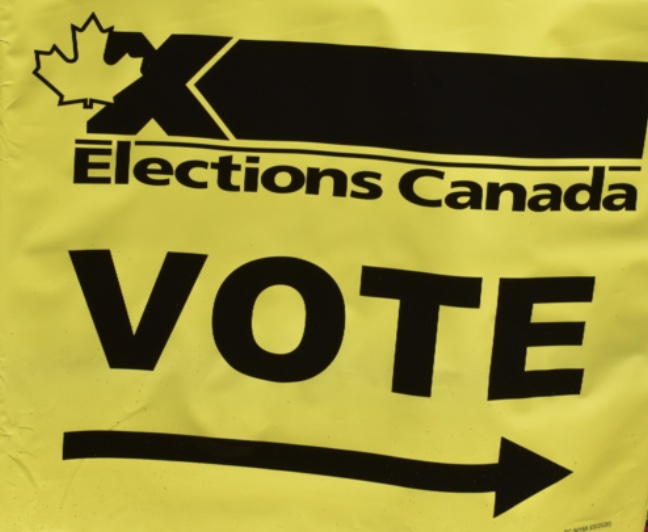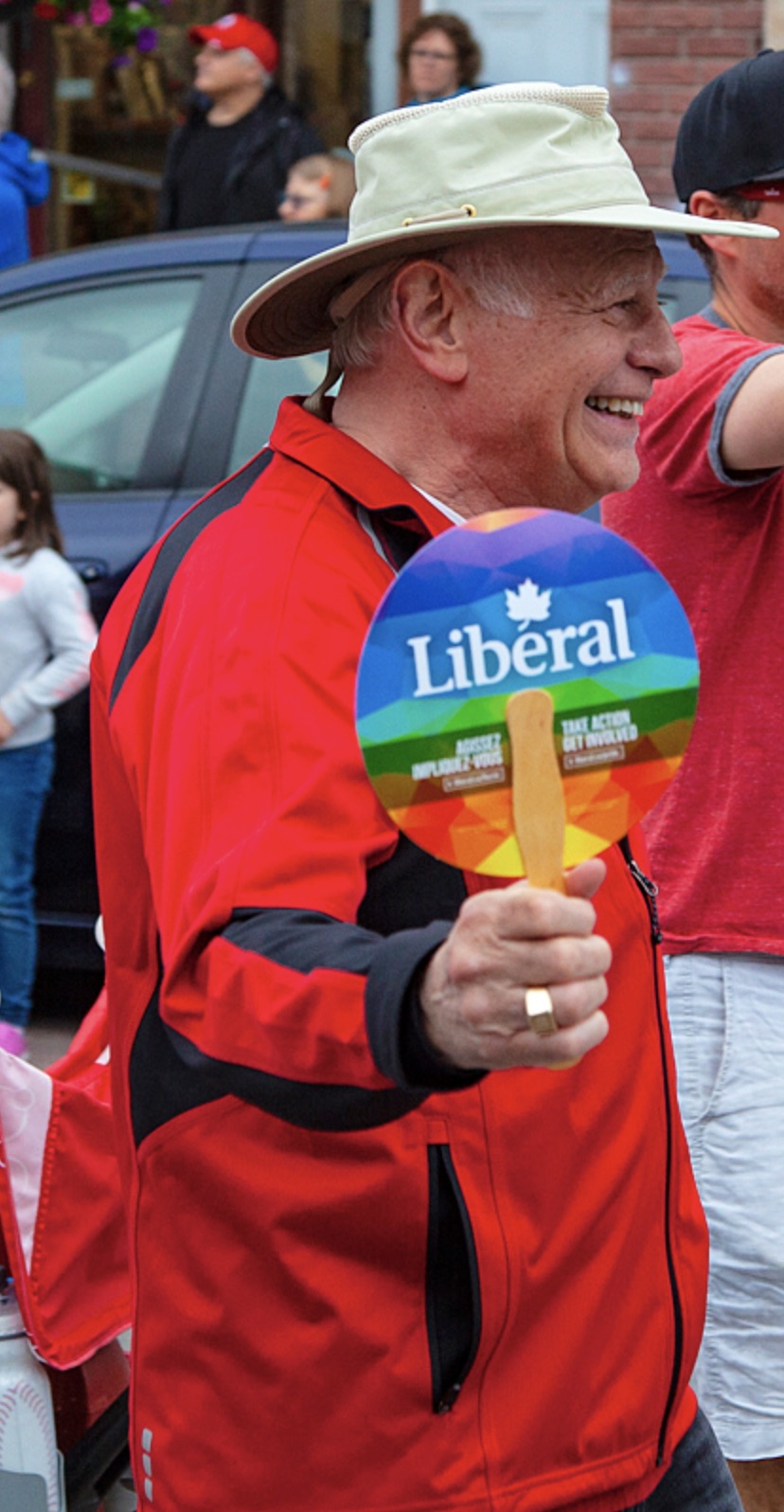- Details
- Written by Gordon Prentice
There are no riding polls in Newmarket-Aurora.
We have extrapolations from polling elsewhere. This is the latest from 338Canada.com.
The wild card is the People's Party of Canada.
At the last Federal Election in 2019 only 1% of Newmarket-Aurora voters backed the PPC. That percentage is almost certain to increase and the votes will be disproportionately drawn from the Conservatives.
Van Bynen lends a hand to the PPC
In 2019 the Liberal candidate, Tony Van Bynen, and other leading local Liberals signed the nomination papers of the then PPC candidate, Andrew McCaughtrie, to get his name on the ballot paper and syphon votes from the Conservatives.
A candidate's nomination papers must be signed by 100 registered electors. Elections Canada recommend candidates submit nomination forms signed by 150 electors to cover any mishaps.
I shall be checking with Elections Canada to see if Van Bynen or any Liberals signed Andre Gagnon's nomination papers. But, this time, I rather suspect not.
This email address is being protected from spambots. You need JavaScript enabled to view it.

- Details
- Written by Gordon Prentice
There are no riding polls in Newmarket-Aurora.
We have extrapolations from polling elsewhere. Polling organisations say Newmarket-Aurora is a toss-up. But 338Canada.com is giving the Liberals the edge.
Differential voter turnout is likely to be a key factor in determining the result. And we do not know how many votes the PPC will draw from the Conservatives.

- Details
- Written by Gordon Prentice
This rushed pandemic election could mean a lower turnout as voters find their usual polling station is no longer available and they have much farther to go to cast their vote. 
In my own case, I have to go to the Church of the Nazarene in Main Street South about two kilometres away. Usually, I vote at the Canadian Martyrs Elementary School which is next door.
I would walk across broken glass to vote but some people could be put off by the inconvenience of having to vote outside their neighbourhood where there is no direct bus link.
One third fewer polling places
Newmarket Today tells us there are about 17 fewer polling sites in Newmarket-Aurora compared with 2019 and the reduction is a direct result of Covid and the safety protocols that must now be put in place. There are 33 polling sites this year compared to 50 in 2019, a 34% decrease.
But some GTA ridings have been hit much harder than us.
Global News reports that 11 GTA ridings have seen more than half their polling stations disappear with the hardest hit riding, Toronto Centre, going down from 91 to 15.
Madness
Our next door neighbour, Aurora-Oak Ridges-Richmond Hill, is going down from 44 to 17.
To me, this is just another example of the madness of calling an election in the middle of a pandemic. Turnout could easily be a casualty.
Turnout here in 2019 was a fraction over the national average, 67%.
Advance Voting
In 2015, 10,675 people voted in advance in Newmarket-Aurora. This increased to 15,352 in 2019.
This year the number of people voting in advance appears to be holding up well. But advance voters are often more highly motivated and committed than your average voter.
This email address is being protected from spambots. You need JavaScript enabled to view it.
The advance vote in Newmarket-Aurora:

- Details
- Written by Gordon Prentice
There are no riding polls in Newmarket-Aurora.
We have extrapolations from polling elsewhere. But 338Canada.com now calculates the odds of winning Newmarket-Aurora have tipped in favour of the Liberals.

This email address is being protected from spambots. You need JavaScript enabled to view it.
- Details
- Written by Gordon Prentice
A week ago, the Deputy Prime Minister, Chrystia Freeland, dropped in on Tony Van Bynen’s campaign office on Davis Drive opposite Southlake. She tweets:
"Tony Van Bynen is a strong community leader and it is so important for his work to continue in Parliament."
But is he a strong community leader? 
Where is the evidence?
He has been around a long time but is that enough?
No leadership
Five years ago, former Newmarket councillor Dave Kerwin told Van Bynen to his face in front of a packed Council Chamber:
“You never show any leadership!”
At the time Kerwin was the longest serving councillor in Canada. He stands by that brutal assessment.
Who has the measure of the man? Chrystia Freeland who has known Van Bynen for five minutes? Or Dave Kerwin who has observed Van Bynen close-up for decades?
In October 2014 I wrote:
“Mayor Tony Van Bynen has many fine qualities but leading from the front is not one of them.”
The Canadian Oxford Dictionary says
“a leader is a person that leads; a person followed by others.”

Followership
Van Bynen has been known to talk of the benefits of "followership". His centrist politics are all about neighbourliness and respect. He rarely stakes out a position and argues for it, calling on others to rally round. He calculates and tests the water. He says he “scopes” before making a move. He bides his time and never acts on impulse. This is appropriate behaviour for a cautious banker.
Of course, Van Bynen has his own agenda. But when he is on the wrong side of the argument he will often choose to stay silent, refusing to engage with the issues.
On 26 January this year he told the Commons that his experience as a banker taught him the importance of working together:
“toward a common goal and avoid acrimonious criticism, which is counterproductive for everyone.”
In his taxpayer funded flyer from September 2020 he talks about:
“getting things done – not partisanship”
When COVID was raging he talked of his experience on the House of Commons Health Committee:
“The acrimony of partisan politics has, for the most part, been replaced by co-operation and a willingness to do what is right.”
"Partisan posturing"
But this warm and cuddly non-partisanship only works on his terms. His relationship with the Health Committee soured when members sought to pursue their own agendas – not his. He accused them of “partisan posturing”.
In my time in Newmarket there have been several major policy issues affecting the Town where Van Bynen, a former Mayor, was on the wrong side of the argument and failed to persuade his colleagues to follow his lead, such as it was.
Minority of one
Example 1: The Clock Tower. Van Bynen supported plans drawn up by his friend, the developer Bob Forrest, to build a huge condo in the middle of the Town’s downtown heritage district. The plans involved the demolition of irreplaceable heritage buildings but with their facades retained. He described this vandalism as a great example of the intensification we need.
He failed to persuade his colleagues and was in a minority of one.
Example 2: The population of York Region is greater than some Provinces yet its Chair/Chief Executive is not elected by the voters at large but indirectly by 21 members of the Regional Council.
Newmarket Council passed a resolution calling for the direct election of the Regional Chair. Van Bynen wanted to stick with the status quo but couldn’t persuade his council colleagues to support him. Again, he was in a minority of one.
When the matter came before the Regional Council Van Bynen shamefully voted against his own Council’s position. Yet he brazenly describes himself as a “trusted” community leader.
Ease into it
Example 3: Van Bynen is a gradualist. So when Metrolinx announced in 2016 that the 15 minute all-day two-way GO Train service would terminate at Aurora his first reaction was to accept the decision, saying we should “ease into it as we go forward”. Not much leadership there. It falls to the present Mayor, John Taylor, to press Metrolinx to move on the transformational fast rail service and not just leave it in the pending tray. In 2016 Taylor was pushing for action. Van Bynen was the bystander, going with the flow.
Example 4: Glenway is now slipping into history. But the massive redevelopment of the old Glenway golf course in the Town’s north-west quadrant was a hugely contentious issue at the time. The property developer Marianneville had paid less than C$10M for the old golf course gambling it could get planning permission to change its use to housing. And that is exactly what happened.
The Town hired a planner on contract to develop its response and she did so without any supervision or guidance from Mayor Van Bynen who left her completely alone. Her report came down in favour of redevelopment which impacted hundreds of Glenway people, turning their lives upside down. By then it was too late for the Town to develop an alternative position.
Van Bynen said lessons would be learned but to this day he hasn’t told us what these are. Except one:
"We learned from Glenway that polarity doesn't help anybody."
Winners and losers
However, some highly contentious issues are, by their very nature, zero-sum.
There is a winner and a loser.
There is no middle way.
It follows that Van Bynen will never, for example, argue the case for a nationwide handgun ban.
There would be too much polarity.
This email address is being protected from spambots. You need JavaScript enabled to view it.
Page 89 of 286